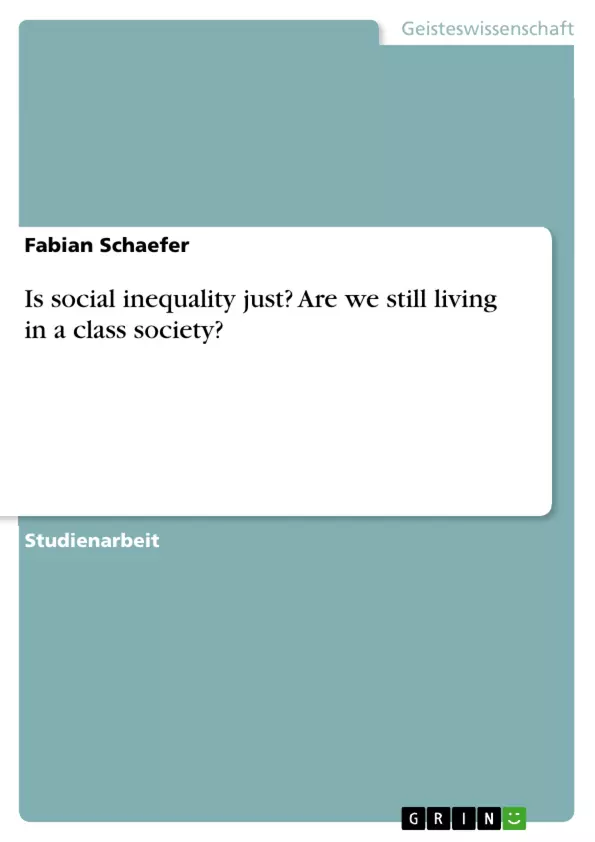Within the 3 years from 2002 to 2005 the gap between rich and poor became bigger. While the average income declined by 4.8%, the income of the rich increased. The poverty report of the Federal Republic of Germany states that good education, starting at the early childhood, is the key to overcome those differences and that the level of a child’s education in Germany is based too much upon the level of its parent’s education.
This brings up the question whether we are still living in a class society where it is predetermined with what degree children end up. Because the social market economy that was arranged after World War II had the equality of opportunities as one of its main goals we have to ask our self whether the social component has failed and whether we therefore live in an unjust society.
Regardless that some people argue that a difference in income is an important factor of a social market economy, no one can claim that inequality in educational opportunities is just and necessary for a social market economy to work properly. Better education for everyone would even lead to more prosperity. The outcome of this is that the inequality in educational opportunities is one of the main factors of social inequality in Germany and holds back the growth of the economy. Therefore I will examine the differences within the educational system and the causes for those.
In order to do so I will first show the statistical differences of educational opportunities and how they rely on a parent’s education or migration. I will then give a short overview how the government is trying to reduce those differences and will examine how the General Mental Abilities (IQ) depend on the parental care and in which phases of childhood they are developed. Based on those results I will show why the efforts made by the federal Governments and states since the seventies could not bring the improvements they hoped for.
Inhaltsverzeichnis
- 1. Introduction
- 2. Differences of educational Opportunities
- 2.1 Based on the Education and Income of the parents.
- 2.2 Based on Migration
- 2.3 Recapitulatory Hypotheses......
- 3. Efforts of the German government to reduce the social inequality within the educational system .......
- 4. The Role of General Mental Abilities..
- 5. Conclusion..........\n
Zielsetzung und Themenschwerpunkte
Diese Hausarbeit analysiert die Ungleichheiten im deutschen Bildungssystem und untersucht, ob diese zu einer ungerechten Gesellschaft führen. Dabei wird die Frage aufgeworfen, ob die Chancengleichheit, ein Kernelement der Sozialen Marktwirtschaft, im Bildungsbereich nicht erfüllt wird.
- Der Einfluss der elterlichen Bildung und des Einkommens auf die Bildungserfolge von Kindern.
- Die Auswirkungen von Migrationshintergrund auf die Bildungsmöglichkeiten von Kindern.
- Die Bemühungen der deutschen Regierung, die soziale Ungleichheit im Bildungssystem zu reduzieren.
- Die Rolle der allgemeinen geistigen Fähigkeiten (IQ) im Bildungsprozess.
- Die Analyse der Gründe, warum die seit den 1970er Jahren unternommenen Anstrengungen zur Verbesserung der Chancengleichheit im Bildungssystem nicht die erhofften Erfolge erzielen konnten.
Zusammenfassung der Kapitel
Das erste Kapitel führt in die Thematik der sozialen Ungleichheit im Bildungssystem ein und beleuchtet die wachsende Kluft zwischen Arm und Reich in Deutschland. Das zweite Kapitel untersucht die Unterschiede in den Bildungsmöglichkeiten, insbesondere im Hinblick auf den Einfluss der elterlichen Bildung und des Einkommens sowie den Einfluss von Migrationshintergrund. Das dritte Kapitel beleuchtet die Maßnahmen der deutschen Regierung zur Reduzierung der sozialen Ungleichheit im Bildungsbereich. Kapitel vier untersucht die Rolle der allgemeinen geistigen Fähigkeiten (IQ) im Bildungsprozess und ihre Abhängigkeit von der elterlichen Fürsorge.
Schlüsselwörter
Die Arbeit beleuchtet wichtige Themen wie soziale Ungleichheit, Bildungsgerechtigkeit, Chancengleichheit, elterliche Bildung, Einkommen, Migrationshintergrund, allgemeine geistige Fähigkeiten (IQ), Bildungspolitik und die Analyse der Wirksamkeit von staatlichen Maßnahmen zur Verbesserung der Chancengleichheit im deutschen Bildungssystem.
Häufig gestellte Fragen
Besteht in Deutschland noch eine Klassengesellschaft?
Die Arbeit untersucht, ob Bildungschancen so stark vom Elternhaus abhängen, dass man von einer vorbestimmten Klassenstruktur sprechen kann.
Wie beeinflussen Einkommen und Bildung der Eltern den Erfolg der Kinder?
Statistiken zeigen, dass der Bildungsweg eines Kindes in Deutschland immer noch überproportional stark vom Bildungsgrad und Einkommen der Eltern abhängt.
Welche Rolle spielt der Migrationshintergrund bei den Bildungschancen?
Die Arbeit analysiert, wie Kinder mit Migrationshintergrund im deutschen Schulsystem oft vor zusätzlichen Barrieren stehen, die ihre Aufstiegsmöglichkeiten einschränken.
Haben die staatlichen Maßnahmen zur Chancengleichheit versagt?
Die Untersuchung hinterfragt kritisch, warum die Anstrengungen der Bundesregierungen seit den 1970er Jahren nicht zu den erhofften Verbesserungen bei der Bildungsgerechtigkeit geführt haben.
Wie hängen IQ und elterliche Fürsorge zusammen?
Die Arbeit beleuchtet, wie sich allgemeine geistige Fähigkeiten (IQ) in frühen Kindheitsphasen entwickeln und wie stark diese Entwicklung von der Qualität der elterlichen Betreuung beeinflusst wird.
- Quote paper
- Fabian Schaefer (Author), 2008, Is social inequality just? Are we still living in a class society?, Munich, GRIN Verlag, https://www.grin.com/document/170923



